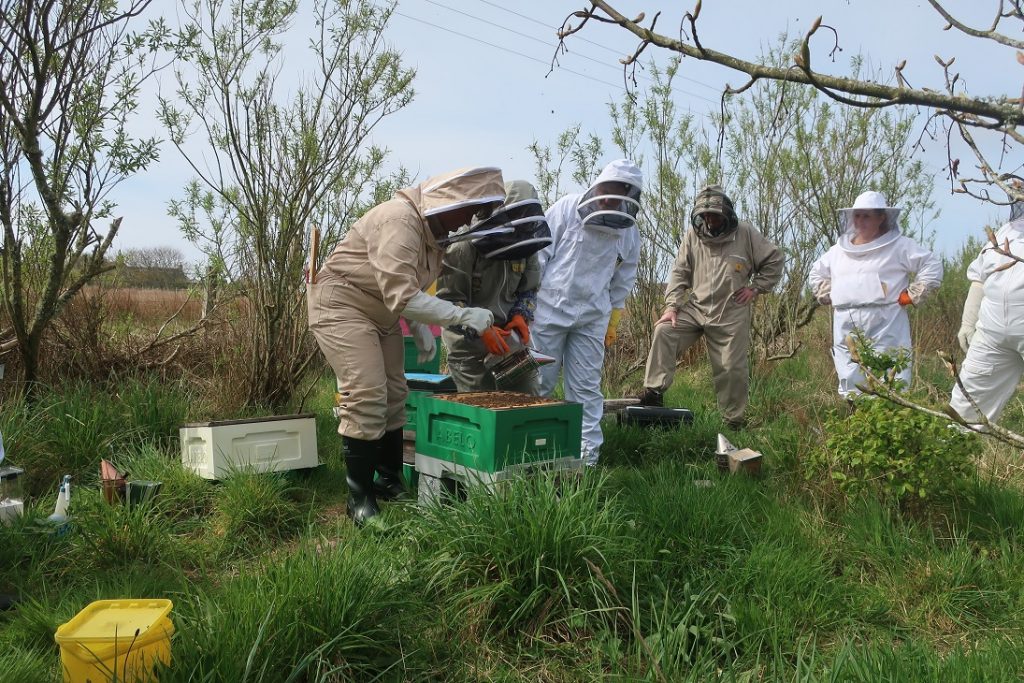
Welcome to New Subscribers.
Here we are in June already and my colonies are sorted following swarm control (or so I think!) and waiting for new queens to get mated. The weather is warm and the nectar is flowing in the right direction; into the hives. Welcome to all the new Beelistener subscribers who joined this month, and thank you to everyone who generously donated towards the upkeep and security of the site.
Journey to Thurso.
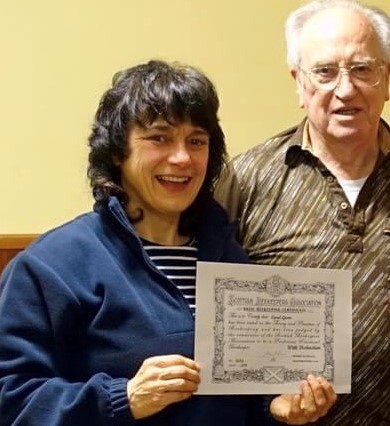
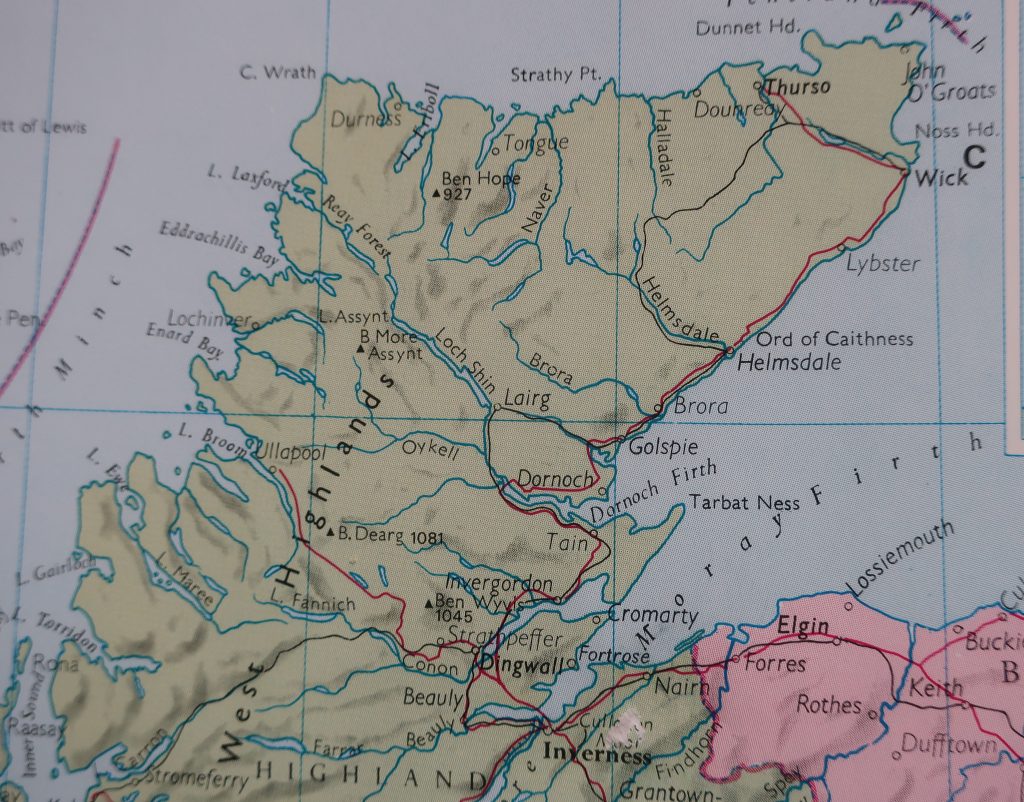
I took the bus to Thurso in the far north a couple of weeks ago to visit the Olrig & District Beekeepers’ Association. Mover and shaker, Carol Gunn organised a training day and invited me to come up and teach an engaging group of 11 beekeepers, at various stages of experience, the skills to improve colony handling and for passing the Basic Beekeeper Exam which some were applying to sit. Carol is one of these inspiring and dynamic people that every association needs. She has an insatiable appetite for learning and will travel literally to the ends of the earth to find it. Very recently she drove nearly 700 miles (one way) to Stoneleigh in the south of England to attend a beekeeping course to help her better care for her own bees and teach others. Some people from Yorkshire were moaning about the distance that they had to travel, but not Carol for she is used to getting into her car and going wherever she needs to. When you live in such a remote part of the country you have to be prepared to travel.
The bus swung out of Inverness station in fine sunny weather which was promising to hold for the weekend and our apiary inspection on Saturday. I thought we might be in for a sing song as the cheerful man across the aisle burst into song with a melodious rendering of the famous John Denver number “Take me home country road…” We hadn’t even made it over the Kessock Bridge when his gas was peeped by the wife sitting rigidly beside him frowning with arms firmly folded below a chest that could have held a tea tray in place. Her mouth puckered like a closed coin purse and a withering glare silenced the singer. “I’m only singing” he pleaded. “Well don’t, stop it at once,” he was told. He did. I noticed later that he was holding her hand and seemed quite contented for the rest of his silent journey.
The bus journey took 3.5 hours and we travelled through some beautiful and varied countryside. There were dazzling fields of oil seed rape from Inverness to Tain where the Sutherland countryside gave way to more rugged beauty. It was a lovely change to be a passenger on that winding road to the North. I’d taken the bus because I have a free bus pass and I wanted to keep the costs down for the beekeepers though it is not as comfy as train travel and I can’t read on a bus.
I’d not been on a modern bus for such a long journey before and was glad of the seat belts but noticed that not many other people were wearing them which surprised me. We lurched round corners and bounced over massive potholes and risked being thrown off our seats. The road north seemed in far worse condition than the bad Argyll roads last summer.
If you have ever used the facilities on a bus you will know to time it for a straight piece of road. Not so easy on the coastal road to Wick, and the journey to the back of the bus is hazardous before you even try to navigate your way inside the lavatory. Not for the faint hearted or the unsteady on the feet, but a must for those who have been keeping hydrated on a warm day. Certainly, a scary first-time experience on a bus thundering down into Helmsdale.
The lavatory experience reminded me of going to Apimondia in 2013 and travelling with my two friends Cynthia and Helen out from Kiev on a day trip to see beekeeping projects in the Ukrainian countryside to the north of the city. We set off early in the day and returned as the sun was setting in a glowing pink sky, but in between we spent many hours sitting on the bus as fields and fields of dead sunflowers sped by. We had few comfort breaks and one of us had to beg the driver to stop the bus at the nearest place in the middle of nowhere which was a layby at the top of a very steep hill. There was no cover or privacy and squatting behind the bus facing downhill seemed like the best place till a very slow-moving low-powered motor cycle came chugging up the hill. We all had a good laugh about that later.
I loved seeing small flocks of lapwings fly over the stone-walled fields of Caithness and imagined their distinctive peeping call as they moved over the gorse-clad land. This area has few trees on the coastal side and those that manage to cling on against the winds from the North Sea are small and scrubby. We passed fields of sheep and lambs and stopped at lots of places to let people on and off at their homes along the way. At a small town a dishevelled person in dirty clothes got on clutching a bag of groceries and staggered down the aisle followed closely by an unpleasant odour. Modern buses have good ventilation though and are much more comfortable than the old MacBraynes buses of my childhood days.
The visibility was amazing as we reached the North Coast and the Old Man of Hoy hove into view with Orkney on the right-hand side. Sadly, I was sitting on the wrong side for a photograph so you will just have to venture up and see this magnificent land for yourself.
Training Day.
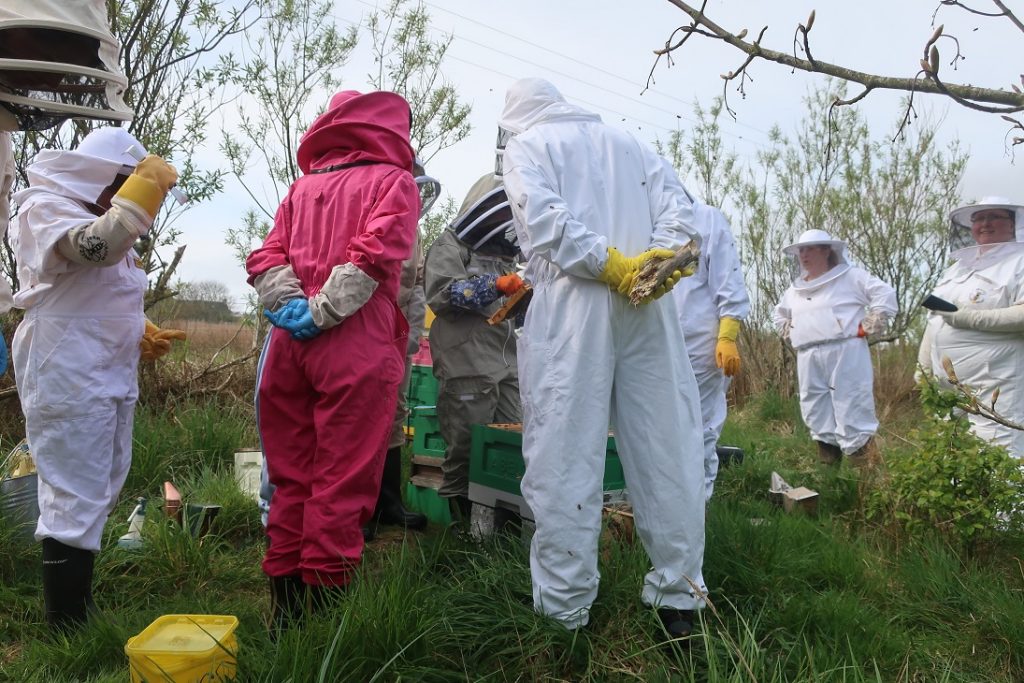
On Saturday morning, I watched snow-white arctic terns wheel overhead in a cloudless blue sky as I waited for my lift to Castletown Drill Hall where we were holding the classroom-based part of the course. The day started with ice-breaker introductions where the group split into pairs and chatted briefly before introducing their partners. 9- year-old Aidan said he was surprised to be the only kid there and was animated and engaged with the whole day despite the length (09:30 till 17:30 hours). In fact, Aidan made my day by refusing to go home at 16:30 when his mother came to collect him and he got permission to stay till the end.
We covered apiary hygiene and swarming behaviour and control in lectures, while the rest of the day involved practical hands-on learning. There was a big buzz in the group and information exchange at break times amongst the attendees some of whom already had bees and varying degrees of experience. They were keen to pass on their knowledge to others and it was great to be part of an interactive day where everyone participated.
After morning lectures and tea, with the most delicious cakes made and served by Anne Bertram, we went next door to the drill hall where there was plenty of space for me to demonstrate a safe working space around the demonstration hive using roofs to hold shallow and deep boxes so that nothing touched the ground. We discussed hive parts and personal safety in the apiary, and I showed the group how to use both hive tools for best efficiency and less disruption to the bees. We discussed smoking the gap between the boxes to reduce squashing bees when we separate them.
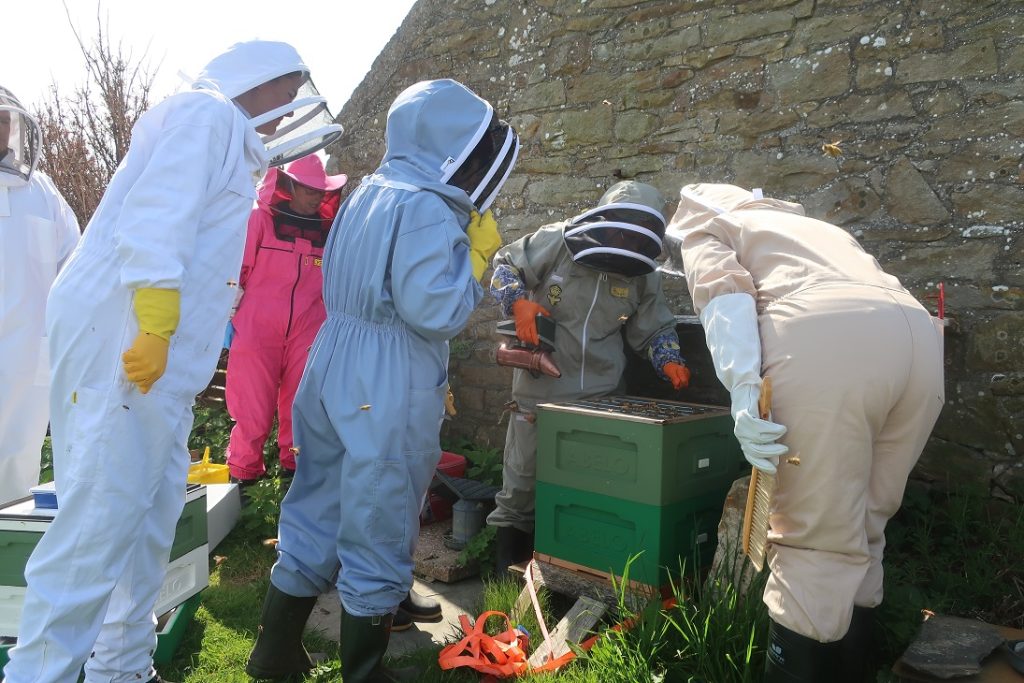
In the afternoon, we visited Sarah Armitage’s lovely spacious apiary near Dunnet Bay and inspected a couple of colonies in warm sunshine. I organised a smoker competition so everyone could learn to keep the smoker going with appropriate fuel for the whole of the time we were inspecting colonies. I’d picked up some Posca marking pens, reduced in the local supermarket, as first prize and seed bombs as runner up in case of a draw, which there was. The tie breaking question was, “what is the most northerly point of the Scottish mainland?” Do you know? Answer at the end.
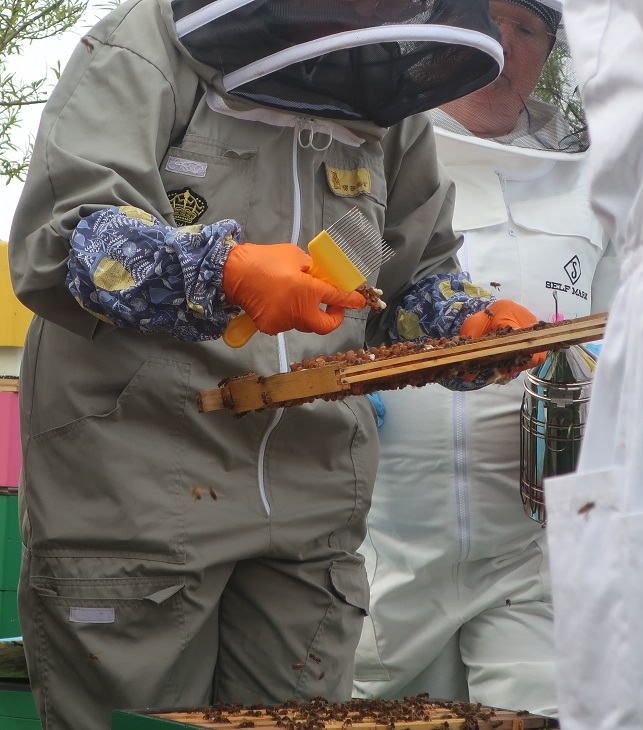
The first colony was a perfect example of a healthy thriving colony positioned in a sheltered spot that protected against a wind that pretty well constantly whips the land here in the north. The second colony was headed by an old queen that Sarah was fond of and had overwintered in a nucleus box. So, the old queen took the colony through winter then ran out of sperm and produced drone brood. We saw varroa running about on some of the drone brood which was a first for some beekeepers as varroa has only recently arrived in Caithness.
It was a successful day and evaluation forms reflected attendee satisfaction. The weather was perfect for us and then it rained most of Sunday as I travelled back home sitting on the coastal side of the bus.

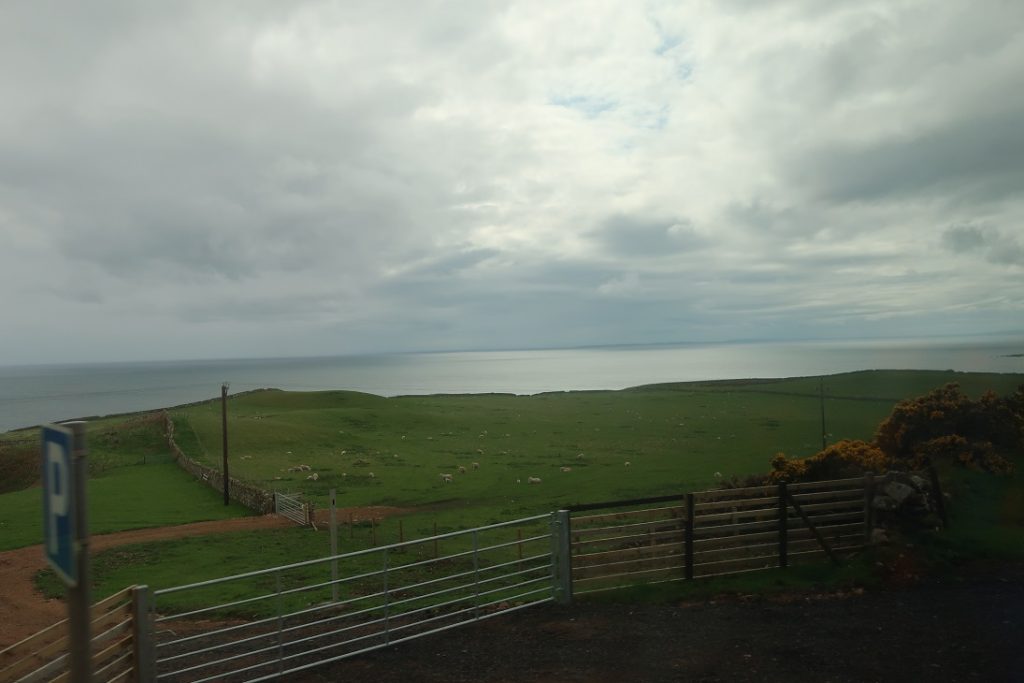
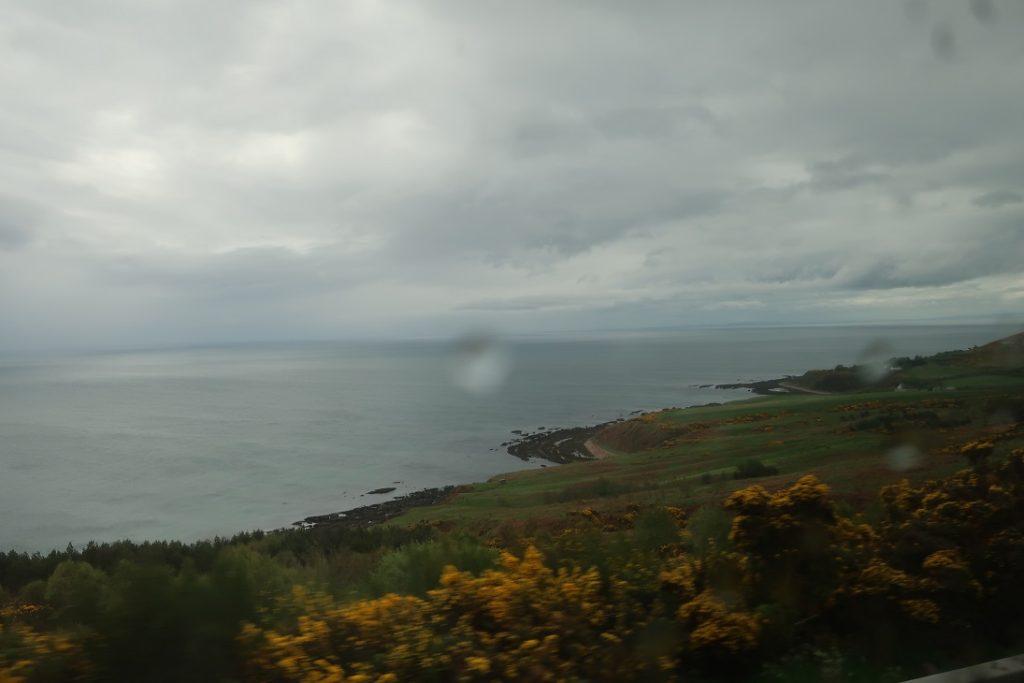
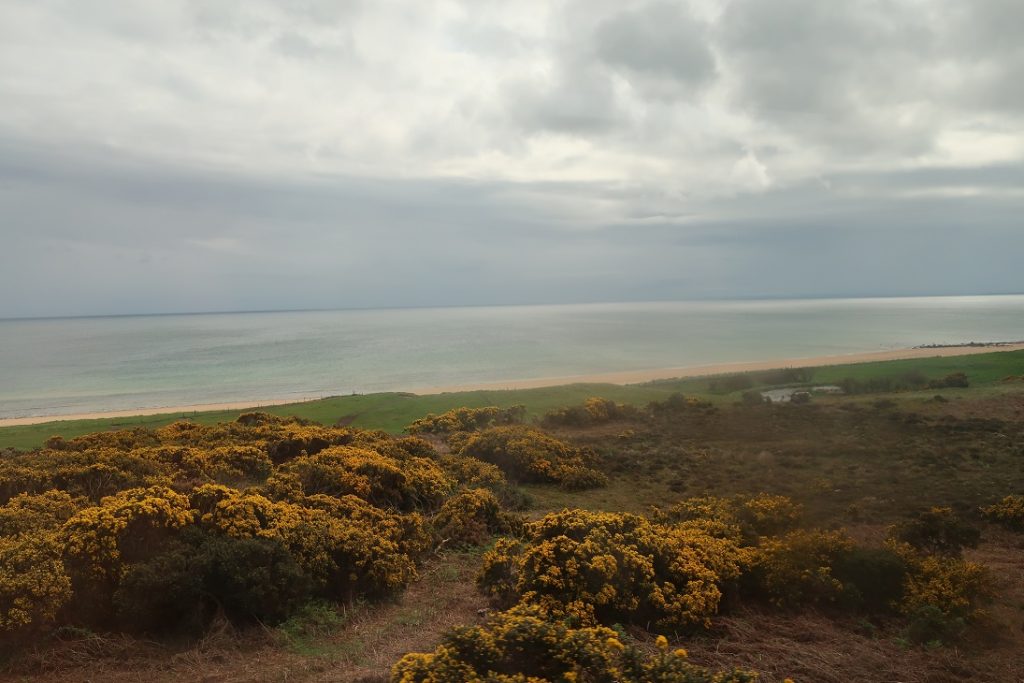
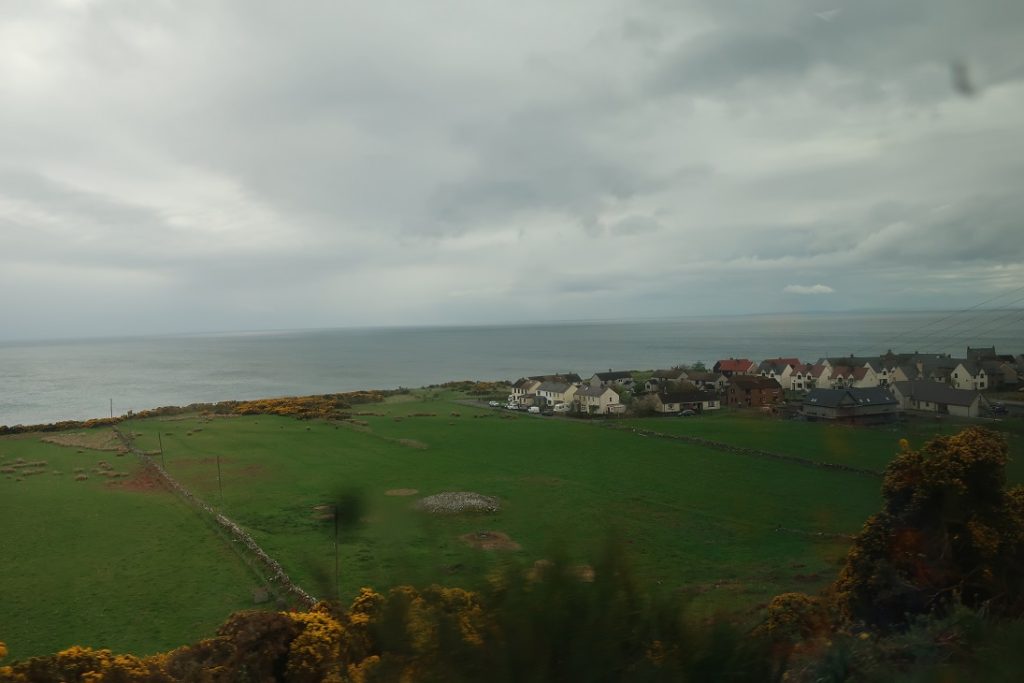
P.S. Dunnet Head is the most northernly point of Scotland.
If you enjoyed reading this, you can subscribe to receive future posts by email. Also, if this article helped you with your work, please consider making a small donation to keep our site running. You can do this through the “Donate with Paypal” button that appears at the side of the screen if you are using a desktop, or by scrolling towards the bottom of the page if you are using a mobile.
Thank you, Ann 🐝
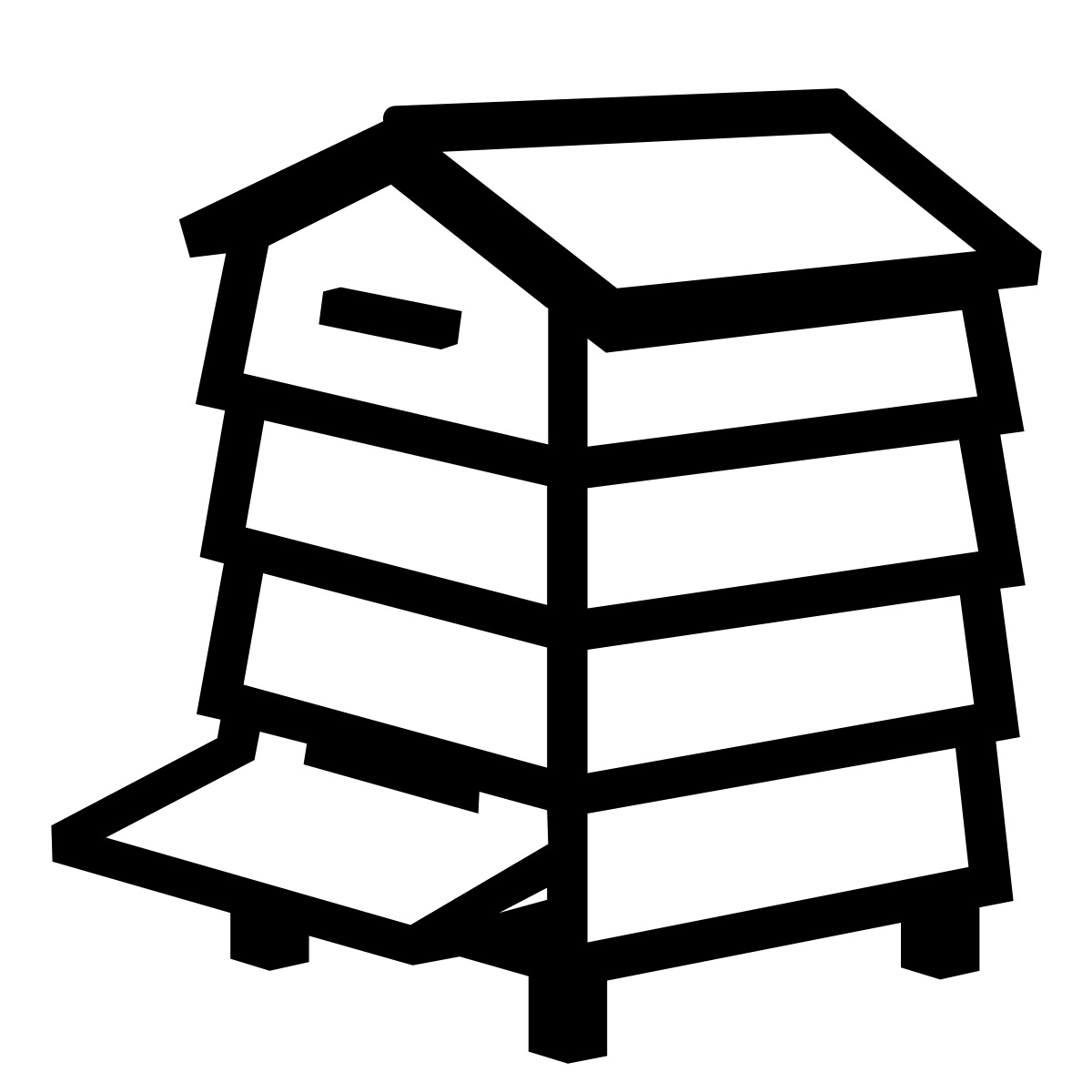
I look forward to your engaging blog every week. Thank you for taking me on your journey. So descriptive, so informative.
Thanks, Mandy. Good to know this.
I’m afraid Dunnet Head may be the most northerly part of mainland Scotland, but Shetland Isles are part of Scotland, therefore the most northerly part of Scotland is Muckle Flugga, just off the coast of Unst at The Noof. The most northerly populated part of Scotland is Norwick on Unst.
Yes, I know Michael. I forgot to say the question applied to the Scottish mainland. Good to know you read that far. Thanks for alerting me to the missing info.
My Shetland friends consider themselves more Scandinavian than Scottish I’m afraid, so if the parochial constructs of civic boundaries etc are ignored, and the heart and history listened to, Ann’s right. I prefer us to choose our own identities – I’m Northumbrian, then Scottish, then British, and definitely European for example. Why should we be chained by other human constructs no more valid than our own sense of self-determination and identity?
Hello Rory and thank you for taking the time for this comment. If you look at place names and listen closely to the dialect in the north (of the mainland) they are also closely aligned to Scandinavia. Our origins and identity are fascinating. I’m a native of Argyll first and foremost though I haven’t lived there since childhood.
What’s funny is that the question for the beekeepers came about because nobody knew who invented the smoker (Moses Quinby) and it was referring to the Scottish mainland but I forgot to include that in the blog. I love it that people actually take time to comment on things. It really keeps a writer on their toes because any inaccuracies, preceived or otherwise, are always quickly picked up on by someone.
Love this blog Ann, my Dad comes from Thurso and we spent many a summer up there, mostly on the beach at Reay, which is west of Thurso. We also ventured up there for Hogmanay; amazing memories!
Hello Gordon,
Thank you for telling me that you enjoyed the blog and that it brought back happy childhood memories. I hope you can come back and take a tour round Scotland. The beekeepers in Caithness would love to meet you. Maybe our SBA convention in Dundee this September?
Hi Ann, Thanks very much for coming to the Far North and delivering such a great session of teaching for our members. It was an excellent day, folk went away with skills they could use immediately with their bees and everyone who I have spoken to since then were delighted.
Hello Carol. It was my pleasure and a memorable weekend all round. Thank you for making everything run so smoothly, and to the team who helped you make the weekend happen. It was fun and we did have a good laugh over the tie breaker question at the end.
Hi Ann. Thank you for writing about your trip to Thurso to teach beekeeping. It is fun to see the photos and to read things like “when his gas was peeped by the wife sitting rigidly beside him” and “mouth puckered like a closed coin purse.” Wonderful descriptions. Please consider writing a book to broadly share your experiences as a beekeeper in Scotland, using photos and writing text like what you presented here. You have a gift of a way with words.
Hello Tom. Well coming from a writer like yourself, this comment is indeed a compliment. Thank you. I will consider taking on the challenge.
I agree with Tom Seeley!
Thank you Mandy for your vote of confidence on that matter. The hard part is starting. It is all in there!
Thanks Ann for this,I very much enjoyed your description of the bus journey and the countryside.